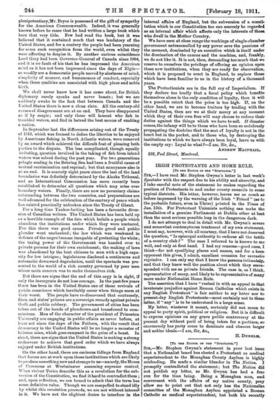IRISH PROTESTANTS AND HOME RULE.
[To THE EDITOR OF THE "SrxgrAToR21 Sns,—I have read Mr. Stephen Gwynn's letter in last week's Spectator with the respect due to his ability and sincerity, and I take careful note of the statement he makes regarding the Position of Protestants in and under county councils in some typical districts.. His letter, however, leaves me as much as- before impressed by the warning of the Irish " Friend " (as to the probable future, even in Ulster) printed in the Times of Jan. 13th. For Protestant Unionists nothing can make the installation of a genuine Parliament at Dublin other at best than the most serious possible leap in the dangerous dark.
I do not attempt to deal in detail with Mr. Gwynn's severe and somewhat contemptuous treatment of my own statement. I must say, however, with all courtesy, that I have not deserved the question, "Is episcopal authority to endorse all the tattle of a country club P" The case I referred to is known to me well, and only at first hand. I had my reasons—good ones, I think—for not specifying places and names, and for a keen opponent this gives, I admit, excellent occasion for sarcastic rejoinder. 1 can only say that I know the persons intimately. and that they knew well the position about which they corre- sponded with me as private friends. The ease is, as I think, representative of many, and likely to be representative of many more under Nationalist Home Rule.
The assertion that I have " rushed in with an appeal to that inveterate prejudice against Roman Catholics which exists in any F.ngliah Protestant" is fair neither to my letter nor to present-day English Protestants—most certainly not to these latter, if " any " is to be understood in a large sense.
My letter, whatever it meant, certainly did not mean to appeal to party spirit, political or religious. But it is difficult to express opinions on any grave public controversy at the present day without peril of being taken for a partizan, so enormously has party come to dominate and obscure larger and nobler ideals.—I am, Sir, &c., H. DincErad.






































 Previous page
Previous page